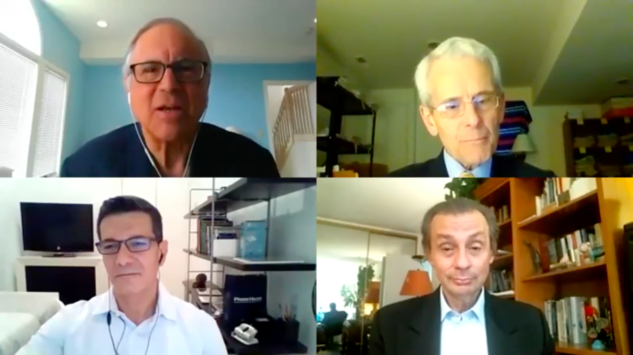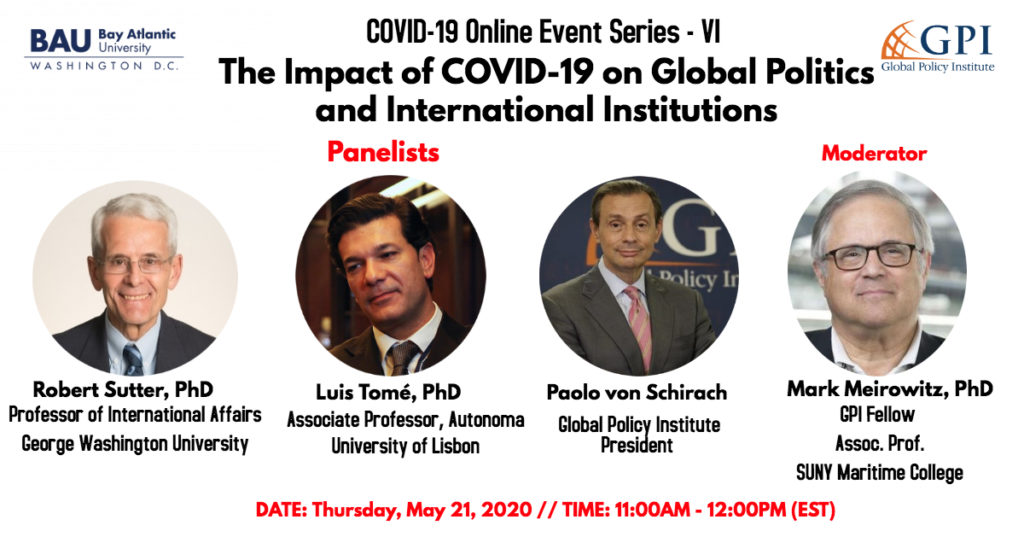Events

The Impact of COVID-19 on Global Politics and International Institutions
Has Covid Changed World Politics?
On May 21st the Global Policy Institute and Bay Atlantic University held an online panel discussion titled:
The Impact of COVID-19 on Global Politics and International Institutions
The COVID-19 pandemic has presented formidable challenges to global politics and international institutions. The perception is that international institutions including the UN and the WHO have not responded effectively to this world crisis. How can we restructure international institutions to respond in the future to world crises and to avoid having such institutions being co-opted by individual States? Also, the pandemic has prompted an evaluation of global politics to determine whether States will pursue nationalism and isolationism, or will seek to work together to forge multilateral solutions to issues that affect the entire world, such as the pandemic. Also, what will the world order look like after the pandemic, and will China, or the United States, dominate this world order, and will the United States pursue leadership of the world to marshal States throughout the world to respond quickly to future challenges.
All panelists agreed that on account of how the COVID crisis has been handled by Beijing, relations between China and the West have taken a turn for the worse. Sutter noted that the crisis allowed the airing of other complicated issues affecting US China relations including the suspicion that China wants to gain a leading edge in sophisticated technologies. Tome’ pointed out that the US is not leading as it used to. While there is mistrust in Europe about China, the old spirit of transatlantic cooperation that tied the US to its NATO Allies in Europe is just not there anymore. Von Schirach noted that this deterioration of the bilateral US China relationship is not a passing phenomenon, it is a structural change. He expressed the hope that the US will try to build a united front with all the democracies. Sutter noted that the US official policy is explicitly focused on cultivating existing and new allies, even though the message from Washington is sometimes confusing. Tome’ explained that Europe would like a China policy of both containment and engagement, recognizing problems but looking for areas of shared interest. Von Schirach noted that the Chinese have been very diligent in cultivating international organizations so that they would adopt more pro-China policies. Regarding Taiwan, all panelists agreed that it will continue to be a very delicate issue. Still, they also agreed that stronger relations between the US and the West with the island nations are likely, including inviting major Taiwanese high tech companies to open new manufacturing facilities in the US.
Panelists
Luis Tomé is Associate Professor at Autonoma University of Lisbon where he is currently Director of the International Relations Department and Director of the research unit OBSERVARE-Observatory of Foreign Affairs. Prof. Luis Tomé has also been Visiting Professor at the Portuguese Military University Institute, the National Defense Institute and the Higher Institute of Police Sciences and Homeland Security, as well abroad at La Sapienza University of Rome, the Academy of Social Sciences and Technology of Angola, East Timor National Defense Institute, and Middle East Technical University (METU) in Ankara.
Robert Sutter is Professor of Practice of International Affairs at the Elliott School of George Washington University (2011 to Present). He also served as Director of the School’s main undergraduate program involving over 2,000 students from 2013-2019. His earlier full-time position was Visiting Professor of Asian Studies at Georgetown University (2001-2011). Sutter has published 22 books (four with multiple editions), over 300 articles and several hundred government reports dealing with contemporary East Asian and Pacific countries and their relations with the United States. His most recent book is The United States and Asia: Regional Dynamics and Twenty-first Century Relations Second Edition (Rowman & Littlefield, 2020).
Paolo von Schirach is the President of the Global Policy Institute and Chair of the Political Science and International Relations Program at BAU. His research and teaching focuses on world affairs, international economics, competition policies, and industrial innovation. Von Schirach is the Editor of the Schirach Report, an online publication focusing on politics, economics and international security. He is a commentator for radio and TV on US foreign and domestic politics. He was a Research Associate at the Center for Strategic and International Studies, CSIS. Later on he served as Director of Communications and as Senior Research Fellow, at the Atlantic Council. He worked as Deputy Director of the Global Security Project at Georgetown University where he also taught in the Graduate Program of the School of Foreign Service.
Moderator
Mark Meirowitz is a GPI Fellow and Assoc. Prof, at SUNY Maritime College. Dr. Meirowitz specializes in Turkish Foreign Policy, U.S.-Turkish relations and Turkish-Israeli relations, as well as American History, American Foreign Policy and Constitutional Law. Previously, he completed the SUNY Levin Fellowship during which he taught English conversation to Turkish Faculty while in residence at Istanbul Technical University. He teaches American Foreign Policy, Constitutional Law and English, and developed a graduate course on Ocean Politics and Law. Dr. Meirowitz frequently appears in the US and Turkish media as an expert on issues related to Turkish Politics and American Foreign Policy.
